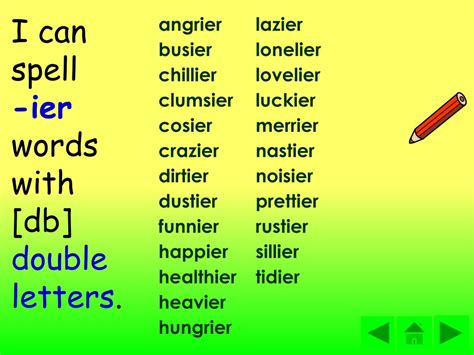Discover Words Ending in Ier: A Quick Guide

In the English language, words ending in “ier” often spark curiosity due to their unique spelling and pronunciation. These words typically belong to a specific grammatical category, primarily serving as comparative adjectives or nouns derived from actions. Understanding their structure and usage can enhance both writing and speaking skills. Let’s delve into the world of “ier” words, exploring their origins, common examples, and practical applications.
The Origins of “ier” Words
The suffix “ier” is a variant of “er,” commonly used to form comparative adjectives or nouns. It often appears in words where the root ends in a consonant + “y” sound, with the “y” changing to “i” before adding “er.” This transformation follows standard English spelling rules, ensuring consistency and clarity. For instance, “happy” becomes “happier,” and “angry” transforms into “angrier.”
Common “ier” Words
Here’s a curated list of frequently used words ending in “ier,” categorized for clarity:
Comparative Adjectives
- Happier – More joyful or content.
- Angrier – More furious or irritated.
- Busier – More occupied or active.
- Calmer – More peaceful or serene.
- Drier – More devoid of moisture.
Nouns
- Volunteer – A person who offers to do something without being forced.
- Engineer – A professional who designs and builds complex systems.
- Pioneer – An innovator or trailblazer in a field.
- Sommelier – A wine expert, often working in restaurants.
- Courier – A person or company that delivers messages or packages.
Pronunciation Tips
Pronouncing “ier” words correctly is crucial for effective communication. The suffix is typically pronounced as /iər/, with the stress on the first syllable. For example, “happier” is pronounced /ˈhæpɪər/, and “volunteer” is pronounced /ˌvɒlənˈtɪər/. Practice these words in context to master their pronunciation.
Usage in Sentences
Incorporating “ier” words into sentences can elevate your language. Here are some examples:
Comparative Adjectives:
- “She felt happier after receiving the good news.”
- “The streets were busier during the holiday season.”
- “She felt happier after receiving the good news.”
Nouns:
- “The engineer designed a groundbreaking new bridge.”
- “A sommelier recommended the perfect wine to pair with dinner.”
- “The engineer designed a groundbreaking new bridge.”
Historical and Cultural Significance
Many “ier” words have deep historical roots. For instance, “pioneer” originated in the 16th century to describe settlers in newly colonized lands. Similarly, “sommelier” has its origins in the French language, reflecting the cultural importance of wine expertise. Understanding these origins adds depth to your vocabulary.
Challenges and Common Mistakes
While “ier” words are straightforward, some common errors include:
- Misspelling: Confusing “ier” with “eer” (e.g., writing “happyer” instead of “happier”).
- Incorrect Comparisons: Using “ier” for words that don’t follow the rule (e.g., “more happy” instead of “happier”).
- Pronunciation Errors: Stressing the wrong syllable, such as saying /ɪˈər/ instead of /iər/.
Expanding Your Vocabulary
To enrich your vocabulary, explore related suffixes like “est” (e.g., “happiest”) and “er” (e.g., “runner”). Additionally, study word origins and practice using new words in daily conversations or writing.
Practical Application Guide
Future Trends in Language
As language evolves, new “ier” words may emerge, particularly in technical or specialized fields. Staying updated with linguistic trends ensures your vocabulary remains relevant and dynamic.
Why do some words use "ier" instead of "er"?
+Words ending in a consonant + "y" sound change "y" to "i" before adding "er" to maintain phonetic consistency. For example, "happy" becomes "happier."
Can "ier" words be used in formal writing?
+Yes, "ier" words are appropriate in formal writing, especially comparative adjectives like "busier" or nouns like "engineer."
How can I remember the spelling of "ier" words?
+Focus on the root word’s ending. If it ends in "y" preceded by a consonant, replace "y" with "i" and add "er."
Are there exceptions to the "ier" rule?
+Yes, irregular adjectives like "good" (better) and "bad" (worse) do not follow the "ier" pattern.
How do "ier" words differ from "est" words?
+"ier" forms the comparative (e.g., "happier"), while "est" forms the superlative (e.g., "happiest").
By exploring words ending in “ier,” you not only expand your vocabulary but also deepen your understanding of English grammar. Whether you’re a student, professional, or language enthusiast, mastering these words will undoubtedly enhance your linguistic prowess.


